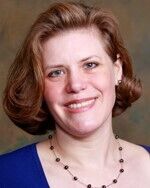Olivia Newton-John, the English-Australian singer and actress who died of breast cancer this week at 73, was a fierce advocate in the fight against cancer. Now, a Maryland oncologist wants people to have the right information to help promote prevention and best outcomes with a breast cancer diagnosis.
“Breast cancer affects one in every eight women in the United States, and it’s the second leading cause of cancer death in the U.S. So it’s incredibly prevalent,” said Dr. Elizabeth Pfaffenroth an oncologist at Kaiser Permanente in Largo.
“Personal risk factors for breast cancer include alcohol intake, obesity, lack of exercise, smoking; there are things that some women aren’t even aware of that can impact their risk of breast cancer, such as having a first pregnancy later in life over the age of 30,” she said.
There may be no warning signs of developing breast cancer, other than feeling a lump in your breast that feels hard as a rock or marble.
“Breast pain does not necessarily correlate with cancer. There are a lot of things that can cause breast pain. Specifically, caffeine can cause breast pain and a lot of women have fibrocystic breasts. So breast cancer is most often painless,” Pfaffenroth said.

Survival rates are highest among women diagnosed with breast cancer if it’s detected early.
“So, that’s really important to have a mammogram once a year if possible,” she added.
The American Cancer Society’s breast cancer screening guidelines suggest women at average risk begin yearly screenings between 40 and 44 years of age. Risk assessment tools mainly based on family history suggest women considered at high risk for breast cancer begin years exams at 30.
“Some women who have a significant family history and significant risk of more than 20% lifetime risk of breast cancer also need breast MRIs to screen because of the significant increased risk,” Pfaffenroth said. “So talk to your doctor about any kind of family history you might have of a really close relative who has breast cancer.”
Even though research has not shown a clear benefit of regular physical breast exams done by either a health professional (clinical breast exams) or by women themselves (breast self-exams), the American Cancer Society said “this does not mean that these exams should never be done.”
Pfaffenroth is one of the health professionals that recommends them.
“Just feel your own breasts and know what your anatomy is once a month,” she said.
If something is changed or abnormal in your breasts, talk to your doctor immediately about setting up a mammogram.
You can find your local mammogram facilities here.








